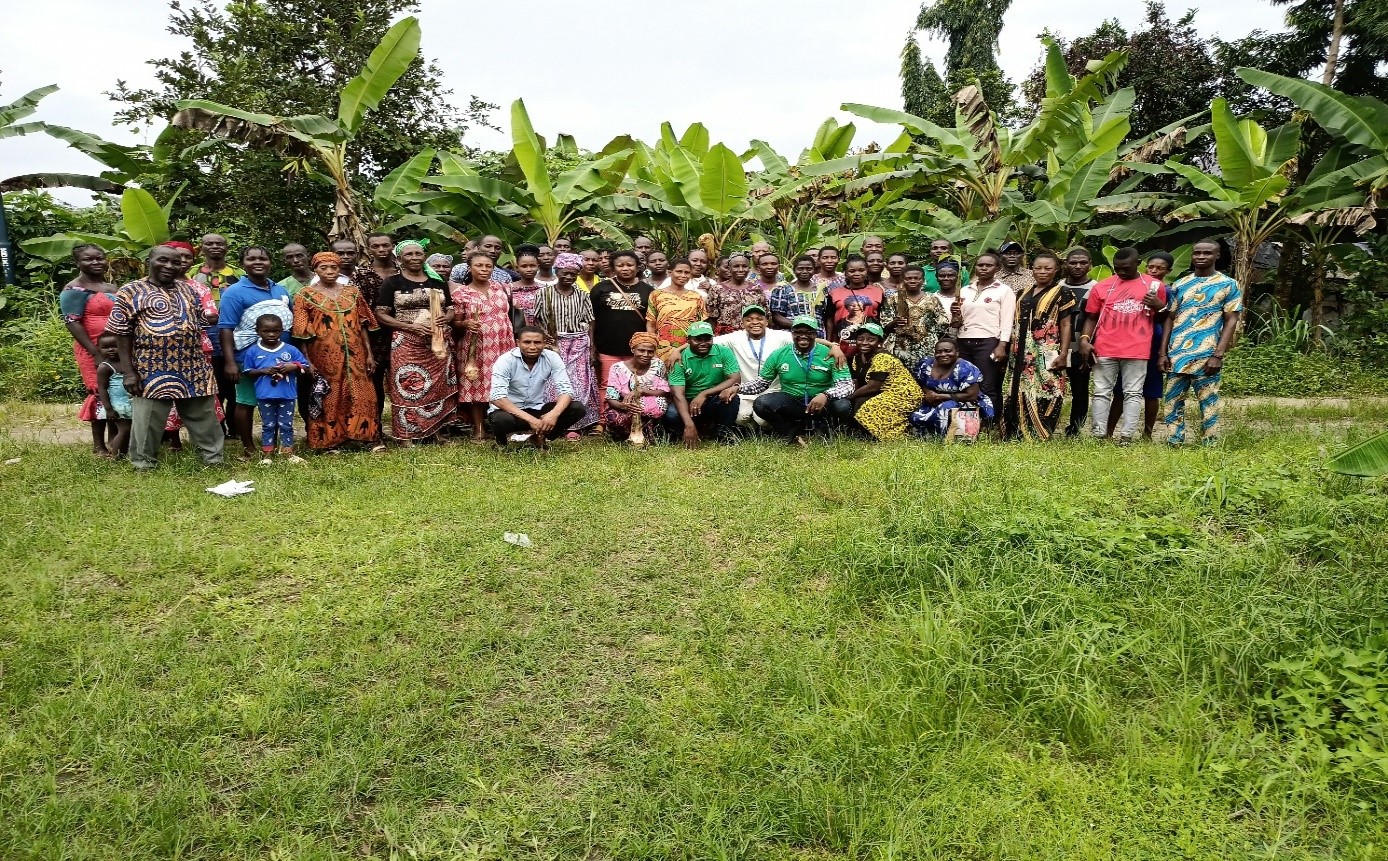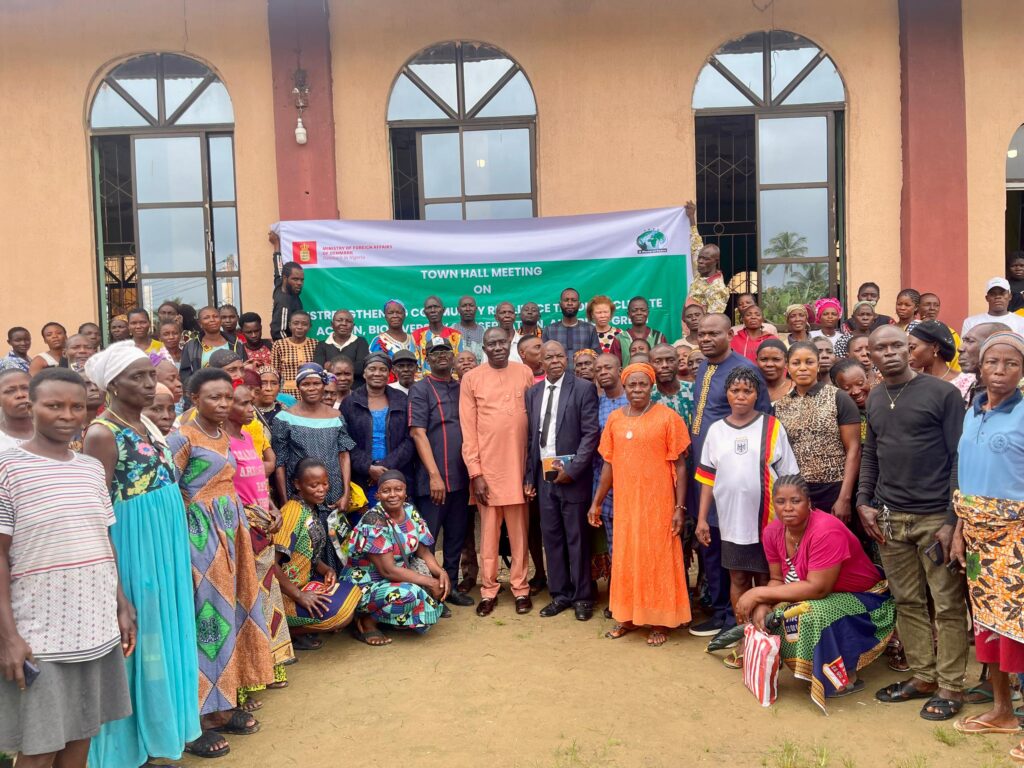Tackling Climate Change Impacts in the Niger Delta: AAPW’s Initiative
The Niger Delta, renowned for its rich biodiversity, is facing significant challenges due to climate change, which impacts both its natural ecosystems and the livelihoods of its people. To address these pressing issues, AAPW is currently implementing a project titled “Advancing Community Capacity to Mitigate Climate Change Impacts and Develop the Green and Blue Economy in the Niger Delta”. This project, funded by the Government of Denmark through the Ministry of Foreign Affairs and the Embassy of Denmark in Nigeria, is being executed in selected communities in Bayelsa and Delta states.
Our approach involves close collaboration with local communities, including Okoroma and Ogboloma/Ayama/Okotiama in Bayelsa State, and Deghele/Ogiedi and Ogulagha/Yobebe in Delta State. We are working alongside government representatives from key Ministries, Departments, and Agencies (MDAs), civil society organizations (CSOs), academia, private sector actors from the blue and green economy, and other experts to build resilience against climate change.
Community Engagement and Climate Challenges
In early project activities, including rapid assessments and baseline studies, followed by inaugural network meetings, community members identified several climate-related challenges affecting their livelihoods, particularly in farming and fishing. While the specific challenges vary from one community to another, all are linked to climate change impacts.
In response, our knowledge exchange and training sessions have focused on practical solutions to the challenges faced by two key communities: Ayama/Ogboloma/Okotiama in Bayelsa State and Deghele/Ogiedi in Delta State. Some of the critical issues identified include:
- Cassava stems dieback during the early stages of planting due to extreme heat waves.
- Pest infestations affect vegetables and fruits.
- Plantain crop decay is exacerbated by pests like nematodes.
To address these challenges, technical experts within our network provided communities with effective mitigation and adaptation strategies. Key solutions include:
- Hot water treatment technique to control nematodes in plantain suckers, reducing crop loss.
- Mulching and the use of cover crops to protect cassava plants from extreme heat.
- Natural pest control methods to manage pest infestations affecting crops like vegetables and fruits.
The knowledge exchange sessions provided community members with hands-on training in these techniques, enabling them to mitigate the effects of climate change on their agricultural activities. These exchanges also served as platforms for community members to express their concerns and share insights into how climate change is impacting their livelihoods.
Hot Water Treatment Technique: A Sustainable Solution for Plantain Farmers
A notable success from the inaugural network meeting in Bayelsa State was the introduction of the hot water treatment technique to control nematodes affecting plantains in the Ayama/Ogboloma/Okotiama community. Nematode infestations, often worsened by extreme climatic conditions, pose a significant threat to plantain farmers who rely on these crops for both sustenance and income.
The hot water treatment method, widely used in regions like Uganda, is an eco-friendly alternative to chemical nematicides, which can harm both the environment and human health. The technique involves immersing plantain suckers in hot water (100°C) for varying durations of 20 seconds, 30 seconds, and up to 60 seconds as the water temperature decreases. Before immersion, the sucker roots are scraped to remove surface nematodes, ensuring a more effective treatment.
This method has proven to be a practical and sustainable solution for controlling nematode infestations, helping farmers protect their crops and secure their livelihoods without the use of harmful chemicals.
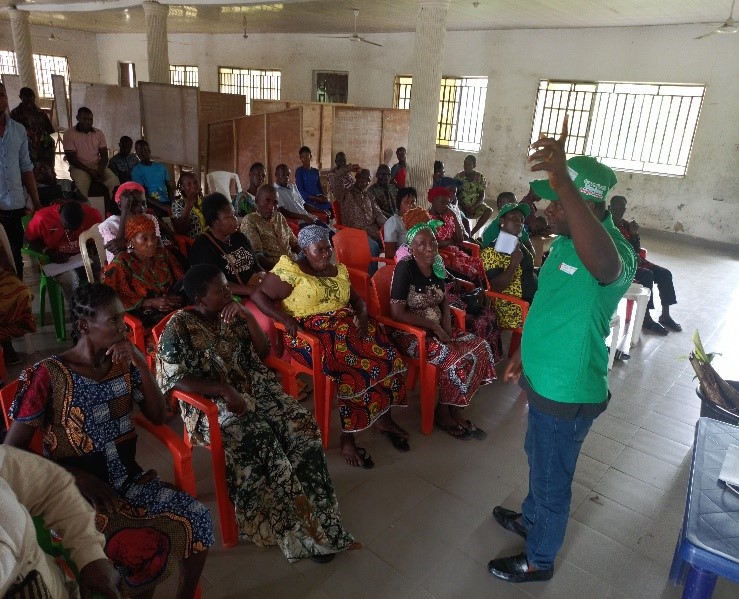
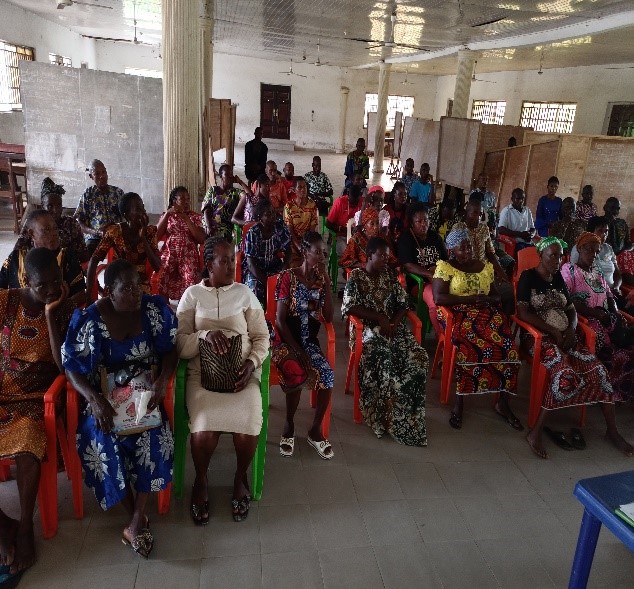
Advantages of the Hot Water treatment technique:
- It is a very easy method to perform and does not require any level of literacy
- It is very cheap to adopt because the farmer only needs water to perform the technique
- It is environmentally friendly as it does not involve the use of harmful chemicals
- It is a sustainable technique which can be passed on from generation to generation.
- It gives the plantain crops more vigour and resistance to attacks from nematodes and other diseases.
- Plantains treated with the hot water technique have recorded more yields than the ones treated with chemicals.
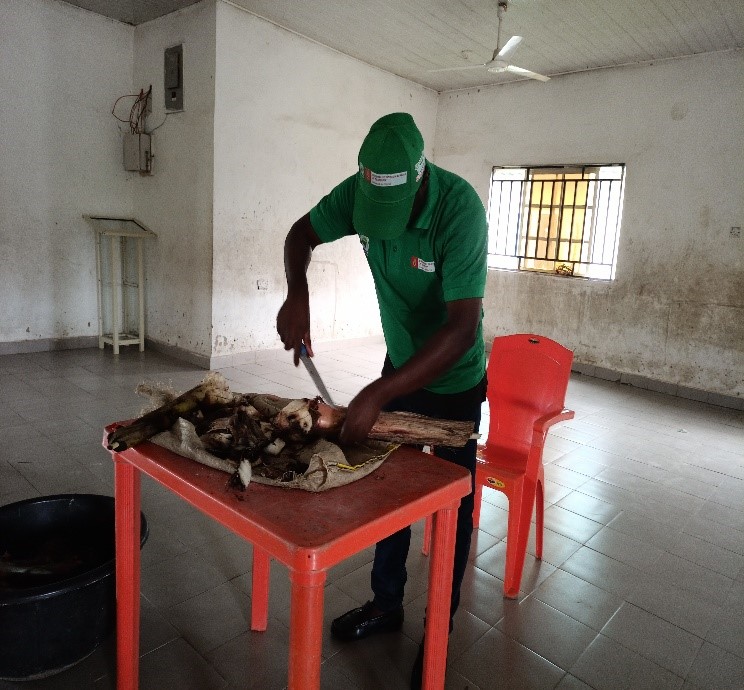
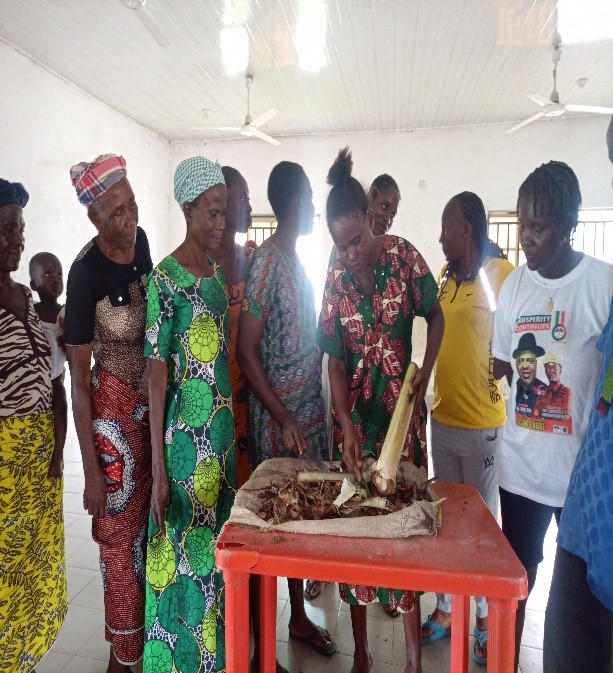
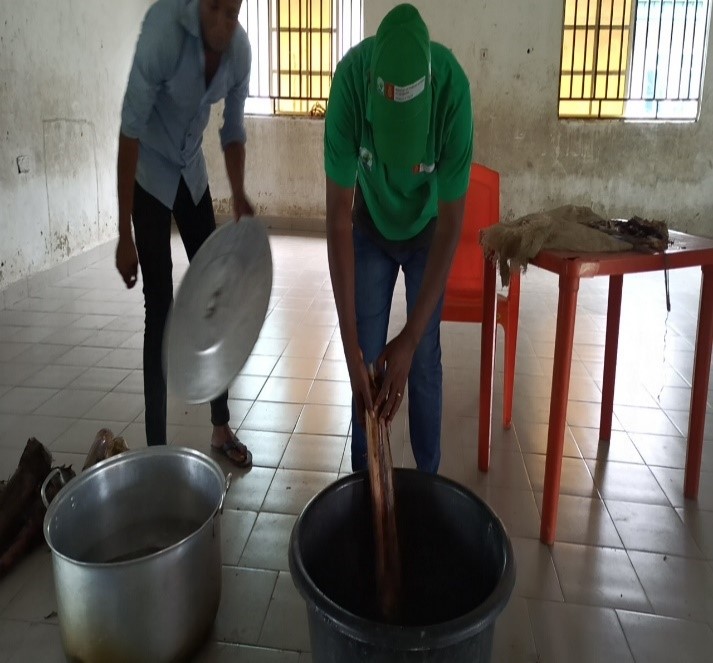
Mulching and the Use of Cover Crops to Prevent Cassava Stem Loss Due to Extreme Heat Waves
In the Deghele and Ogiedi communities, where cassava farming serves as a primary source of food and income, farmers have faced significant challenges in recent years due to changing climate conditions. One of the main issues reported by the farmers during a knowledge exchange session was the dying and wilting of cassava stems during planting. This problem is largely attributed to extreme heat and insufficient soil moisture conservation.
To address these challenges, the adoption of sustainable agronomic practices such as mulching and the use of cover crops was recommended. These practices help conserve soil moisture and mitigate the wilting of cassava stems, ultimately improving crop resilience and reducing farm losses.
As part of the initiative, practical training sessions were conducted in the community on various mulching techniques and soil water conservation strategies. The key solutions introduced included:
- Dry Mulch Application
A widely used practice in crop cultivation, dry mulching involves placing dry plant materials such as leaves, grasses, or straw around cassava stems or seed cuttings. This method helps reduce the direct impact of sunlight, wind, and extreme heat, minimizing evaporation and conserving soil moisture. The mulching materials keep the farmland cool and retain moisture, which is especially beneficial during periods of reduced rainfall or drought. - Live Mulch: The Use of Cover Crops
Another cost-effective strategy is intercropping cassava with cover crops such as the melon crop. Melons were recommended because of their broad leaves and spreading nature, which cover the soil and shield it from excessive heat, helping to maintain moisture levels for cassava plants. Additionally, melon crops do not overshadow cassava, allowing both crops to thrive. This method offers dual benefits: the farmer can harvest both cassava and melon at the end of the season. - Minimal Land Clearing for Soil Moisture Conservation
The traditional practice of clean clearing—gathering and burning plant debris—was discouraged during the training. Instead, farmers were shown how to practice minimal land clearing by leaving organic material such as leaves, grasses, and plant stubble on the land. This organic matter acts as a natural cover, protecting the soil from extreme temperatures and, over time, decomposes into nutrient-rich compost that enhances soil fertility and improves crop yields.
By adopting these sustainable farming practices, cassava farmers in Deghele and Ogiedi can reduce the impact of extreme weather conditions, preserve soil moisture, and improve their overall crop productivity.

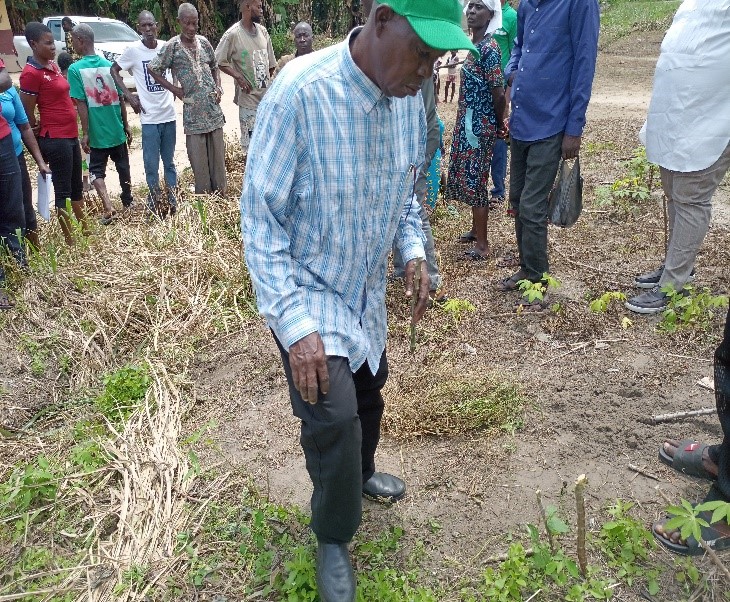
A technical expert demonstrating the cassava stem cutting cultivation and mulching technique
Natural Pest Control for Managing Pests in Vegetables and Fruits
During the knowledge exchange with farmers in the Deghele/Ogiedi community, one of the key challenges highlighted was the prevalence of insect pests, which primarily affect vegetables and fruits. These pests cause issues such as the curling of pepper and vegetable leaves, as well as the premature falling of fruits. This problem is particularly pronounced during periods of extreme heat and reduced rainfall, both of which are associated with changing weather patterns and climate conditions.
To address this issue, a technical expert from our network, an experienced Agronomist, introduced several natural pest control methods, which were demonstrated and taught to the farmers. The solutions included:
- Chilli Pepper and Garlic Spray: This method involves mixing ground pepper or garlic with water and spraying it on the affected vegetables and fruits. The strong taste and smell of the solution repel pests, protecting the plants from further damage.
- Neem Seed Oil: Extracted from the seeds of the neem tree, this oil serves as an effective pest repellent. The taste and smell of neem oil deter insects from attacking crops, and because it is natural and organic, it poses no risk to the plants or human health.
- Wood Ash: Commonly used in rural areas, wood ash from cooking fires is spread over crops. The ash makes the leaves less appealing to pests, driving them away from the vegetables.
Knowledge Exchange with Farmers and Fisherfolks in Okoroma and Ogulagha Communities
In the Okoroma community, focus group discussions were held to address the unique challenges posed by climate change on the local livelihoods. One significant issue raised was the unexplained death of fish in rivers and natural ponds. While the exact cause remains undetermined, potential factors such as underground water contamination or pollution due to flooding were discussed. Further analysis will be required to confirm the cause.
Other key issues raised during the engagement included:
- Pollution and waste disposal, contributing to climate change impacts
- Declining fish catches in recent years
- Soil nutrient depletion due to over-cultivation
- Poor crop growth and yields
- Production of manure and organic fertilizers
- Improved seed varieties and cassava stem cultivation
- Weed and insect pest control
- The absence of farmer cooperatives and the need for collective farming groups
- Fishing policies and regulations
In the Ogulagha/Yobebe community, similar issues were discussed, with additional focus on:
- River pollution
- Declining fish catches
- Fish processing and drying techniques
- The impact of flooding on potato and cocoyam farming
- Alternatives to open-water fishing, such as aquaculture
Outcomes and Achievements
The knowledge exchange and training sessions produced several key outcomes:
- Participants had the opportunity to share their challenges and gain insights into climate change mitigation strategies relevant to their livelihoods.
- The exchange provided a platform for community members to learn from each other and technical experts about the specific climate-related challenges affecting their farming and fishing activities.
- The sessions revealed unique community challenges that will guide future training and capacity-building initiatives.
- 60 farmers were trained in using the hot-water treatment technique to manage nematodes in plantains and banana crops in the Ayama/Ogboloma/Okotiama communities.
- 60 farmers received training in soil water conservation methods, including mulching, cover crops, and minimal land clearing in the Deghele/Ogiedi communities.
- Additionally, 60 farmers in Deghele/Ogiedi were trained in natural pest control methods for vegetables and fruits, promoting the use of environmentally friendly alternatives to harmful chemicals.


